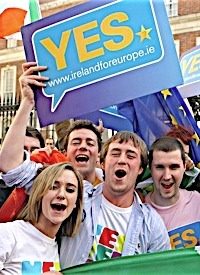
Ireland’s voters went to the polls on October 2 and approved the controversial Lisbon Treaty by an overwhelming 67 percent to 33 percent margin, exceeding the percentage indicated in recent polls.
In a statement made to reporters outside his office in Dublin, Ireland’s Taoiseach (as the Prime Minister is called) Brian Cowen said: “We as a nation have taken a decisive step for a stronger, fairer and better Ireland, and a stronger, fairer and better Europe.”
Cowen also stated: “On this day the full and final credit for this victory rests with the Irish people. They showed an Ireland embracing her future with Europe. Ireland is ready to grow and prosper. Today’s vote will help us achieve a common aim: a prosperous, productive and forward-looking Ireland. We will now apply ourselves to achieving that with imagination, determination and courage.”
An AP summary of the vote and its consequences noted that Ireland (whose voters had rejected the treaty in the last referendum held in June 2008) had been the primary obstacle to ratifying the EU’s Lisbon Treaty. The report noted that the treaty “will make it easier to take decisions by majority rather than unanimous votes, and give national parliaments and the European Parliament more say in shaping EU policies.”
Ireland was the only EU member that gave its citizens an opportunity to vote directly on the treaty, and they had rejected it last year in a 53.4 percent to 46.6 percent vote. AP observed that last year’s rejection was “fueled by fears that an emboldened EU would force neutral Ireland to raise its business taxes, join a European army and legalize abortion.”
Not all parts of Ireland were enthusiastic about approving the treaty, however, including Donegal South West, the home base of Tanaiste (Deputy Prime Minister) Mary Coughlan, who had vigorously campaigned for a “Yes” vote, only to have her constituents reject the treaty by 50.3 percent to 49.7 percent. Of the failure to carry her home district, Coughlin said: “I can only do so much.”
The Irish Independent quoted Coughlin’s statement that it was too early to assess why people in her constituency had voted “No,” but she implied that fears over issues such as abortion, the minimum wage, and "some people disgruntled with the Government" were factors.
The Independent reported that the “No” vote was particularly high in the Inishowen peninsula.
Fine Gael (The United Ireland Party) TD (Teachta Dála — a member of the lower chamber of Ireland’s Parliament) Joe McHugh said: “The people of Inishowen see themselves as being in the 33rd county. [Since Ireland has 32 counties, the 33rd county would be outside the nation.] They feel Dublin governance isn’t working for them. Businesses all along the border are struggling to survive because of the VAT differential. I think people are laying down a marker here.”
The Irish newspaper also quoted Inishowen-based Senator Cecelia Keaveney (of the Fianna Fáil Party) who explained that a leaflet circulated widely outside churches in the peninsula by the Fatima Rosary Group had put “the fear of God” into people by charging that approving the treaty would lead to the EU imposing abortion, euthanasia, and conscription on Ireland.
Also cited was a leading “No” campaigner, Sinn Fein’s Padraig Mac Lochlainn, who attributed the negative vote in the region to what he called the “healthy scepticism” of Donegal people toward the EU.
A BBC correspondent writing about what Ireland’s vote means for the EU observed: “The ‘Yes’ vote by Irish voters on the Lisbon Treaty has brought forward the prospect that the European Union might play a greater role in world affairs. There are two provisions in the treaty which might make this possible. These are for a permanent president of the European Council and a beefed-up foreign policy representative.”
One of the biggest changes would be in the term of office of the EU’s President. Presently, the office is held by the head of state or head of government from the country holding the presidency, a position that rotates every six months. Under the treaty, the EU would elect a President for a two-and-one half-year term, with the possibility of reelection to another term. This change would obviously strengthen the presidency.
A second major change would be to change the name — and increase the responsibilities — of the post of Foreign Minister, who will be called the High Representative.
The new dignitary would chair the meetings of Foreign Ministers and would be the official spokesman for the EU on agreed-upon policies. He would administer the EU’s massive aid budget, and would have a seat on the European Commission.
As a BBC reported observed: “The power to hand out money would inevitably increase the power of the post.”
While gaining the approval of Irish voters cleared a major hurdle to implementation of the Lisbon treaty, it still requires signatures from the heads of state of Poland and the Czech Republic, where national parliaments have already approved the treaty.
President Vaclav Klaus of the Czech Republic is among the sharpest critics of the Lisbon treaty among European leaders, and he has steadfastly refused to sign the treaty.
As a BBC journalist reported from Prague: “When Mr Klaus closes his eyes and thinks of Europe, he sees a community of 27 free and equal nations, bound together by little more than the desire to trade with one another and live in peace. Not a bureaucratic European superstate with a single currency, a joint foreign policy and a president at its helm.”
As news of the Irish referendum’s results reached Prague, anti-treaty demonstrators waved signs against the treaty and in support of Klaus, while shouting: “EU — Fourth Reich!”; “Long Live Klaus!”
“I understand these slogans,” the BBC quoted Klaus speaking to his supporters. “I feel pretty much the same way as you though as the president I have to water it down a little.”
Klaus also issued an unexpected warning: “The Irish had the last chance to say something about Lisbon,” he told the crowd. Because after today’s Irish referendum there will never be another referendum in Europe."
However, Klaus remains stubbornly defiant. Shortly before the Irish vote he told Czech TV: “Nobody should expect I’ll rush to sign it the minute right after the Irish referendum is over.”
A reporter in the Wall Street Journal said of the Czech leader: “Despite all his shortcomings one has to give Mr. Klaus credit for his stubborn focus. He’s long opposed any further E.U. integration at the expense of national sovereignty. He has advocated returning the European Union to the old days of the 1990s when it was named the European Economic Community and had more humble ambitions, focusing on trade and technical standards.”
A man of independent thinking who is an economist by trade and who has published articles in the libertarian free-market Cato Journal, Klaus also refuses to go along with popular views concerning so-called global climate change‚ which he says is a myth that has turned into an ideology that few people dare challenge.
It remains to be seen, however, if Klaus will be able to stick to his position against the inevitable forces that will be brought to bear against him if he resists the EU. Economic pressure can be a powerful club, and all the power brokers who are trying to impose a regional government on all of Europe need to do to neutralize the Czech leader is to use one of the many tools they have available to pull the plug on the Czech economy. The economic carrot and stick was used to sway Irish voters, and it could easily be used to create a sense of economic hopelessness in the Czech Republic, with the Lisbon treaty offered as a ticket to prosperity
Photo: AP Images



